what is docker desktop
docker desktop is the official installation method of Docker on Windows 10 and macOS operating systems. This method still belongs to the method of first installing Linux in the virtual machine and then installing Docker.

The operating environment of this article: Windows 10 system, Docker version 17.09.0, Dell G3 computer.
What is docker desktop?
The method of deploying Docker on Windows is to first install a virtual machine and run Docker in the virtual machine where the Linux system is installed. .
Win10 system
Docker Desktop is the official installation method of Docker on Windows 10 and macOS operating systems. This method is still virtual first. Install Linux on the machine and then install Docker.
Docker Desktop official download address: https://hub.docker.com/editions/community/docker-ce-desktop-windows
Note: This method only applies to Windows 10 operating system Professional Edition, Enterprise Edition, Education Edition and some Home Editions!
Installing Hyper-V
Hyper-V is a virtual machine developed by Microsoft, similar to VMWare or VirtualBox, only available for Windows 10. This is the virtual machine used by Docker Desktop for Windows.
However, once this virtual machine is enabled, QEMU, VirtualBox or VMWare Workstation 15 and below will not be available! If you must use another virtual machine on your computer (such as an emulator necessary to develop Android apps), don't use Hyper-V!
Turn on Hyper-V
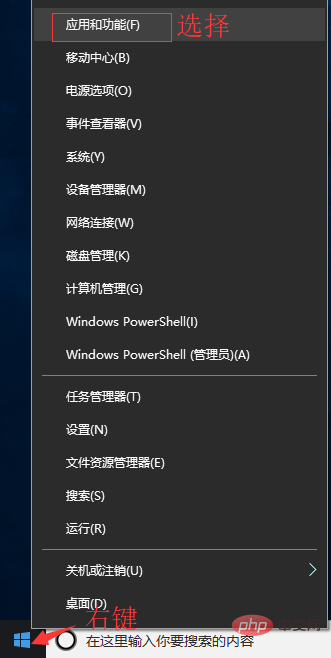
Programs and Features
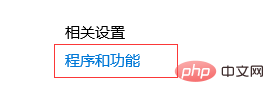
Turn Windows features on or off

Select Hyper-V
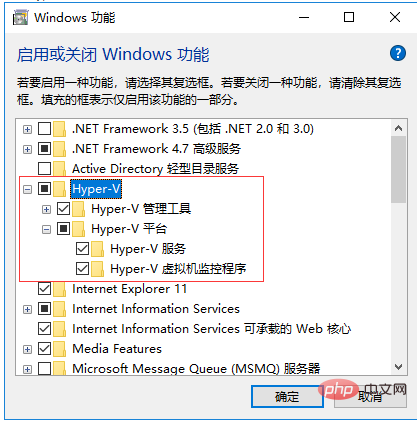
You can also enable Hyper-V through commands. Please right-click the start menu and enter as administrator Run PowerShell as Identity and execute the following command:
Enable-WindowsOptionalFeature -Online -FeatureName Microsoft-Hyper-V -All
Install Docker Desktop for Windows
Click Get started with Docker Desktop and download the Windows version. If you have not logged in, you will be asked to register and log in:
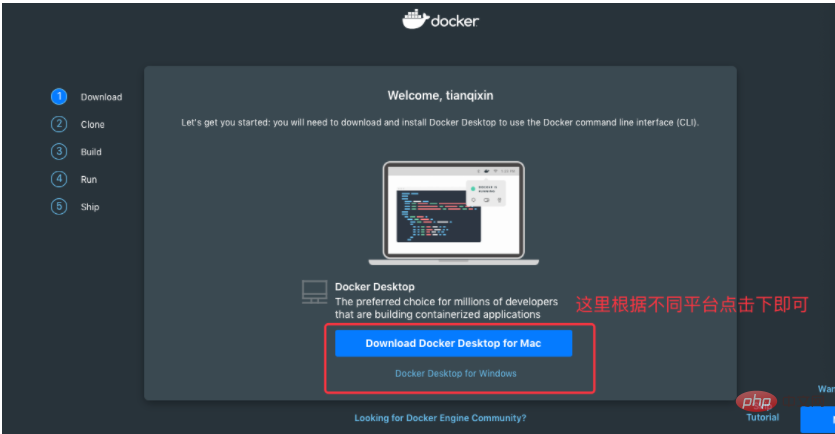
Run the installation file
Double-click the downloaded Docker for Windows Installer installation file, click Next, and click Finish to complete the installation.
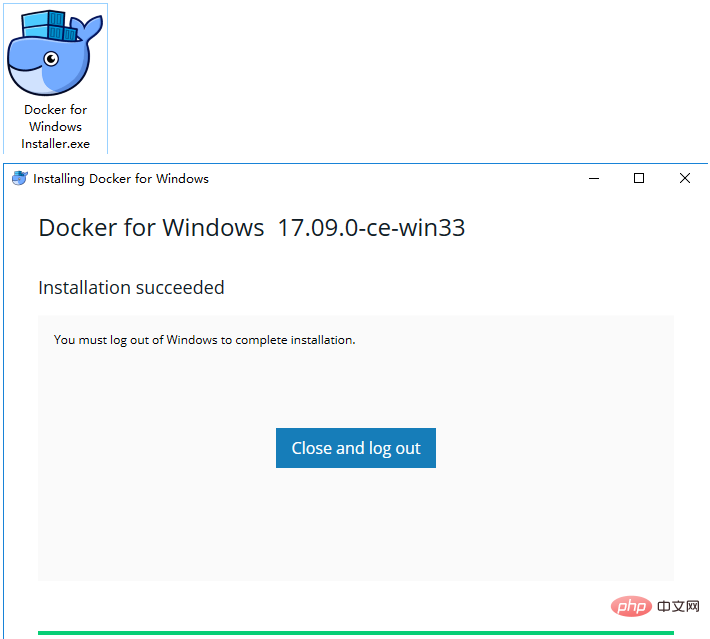
After the installation is complete, Docker will start automatically. A small whale icon will appear on the notification bar, indicating that Docker is running.
Three icons will also appear on the table, as shown below:
We can execute docker version on the command line to view the version number, and docker run hello-world to load the test image for testing .
If it does not start, you can search for Docker in Windows to start it:
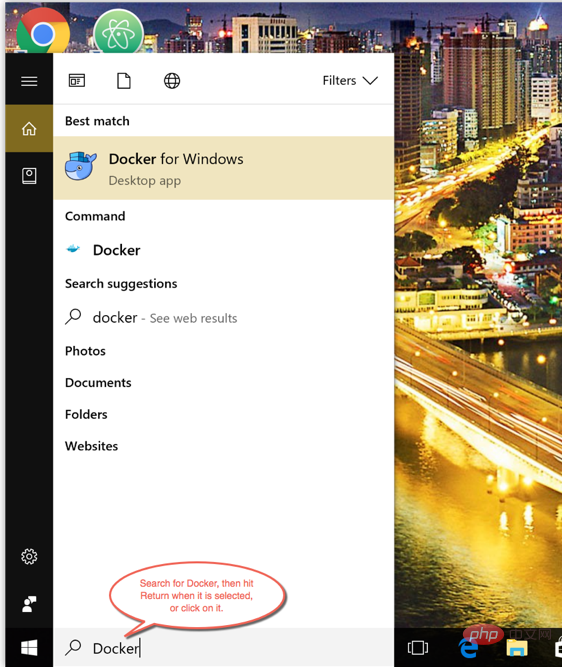
After starting, you can also see the little whale icon on the notification bar:

If you encounter an error caused by WSL 2 during startup, please install WSL 2. [Recommended learning: "Docker Video Tutorial"]
After installation, you can open PowerShell and run the following command to check whether the operation is successful:
docker run hello-world
After successful operation, it should be The following message appears:
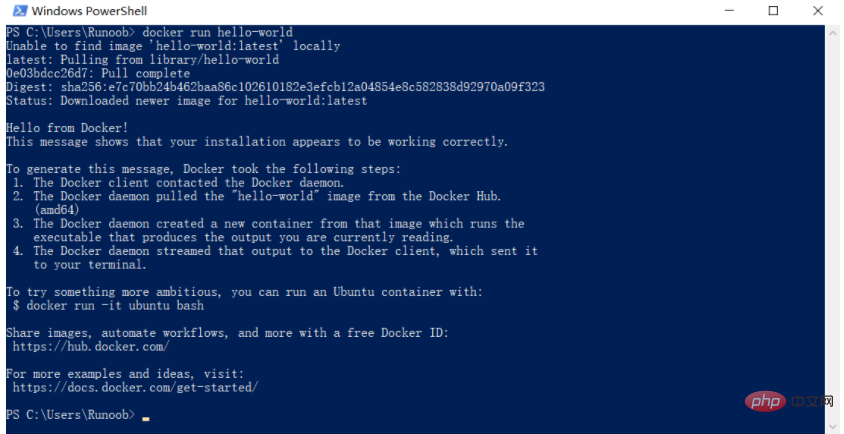
The above is the detailed content of what is docker desktop. For more information, please follow other related articles on the PHP Chinese website!

Hot AI Tools

Undresser.AI Undress
AI-powered app for creating realistic nude photos

AI Clothes Remover
Online AI tool for removing clothes from photos.

Undress AI Tool
Undress images for free

Clothoff.io
AI clothes remover

AI Hentai Generator
Generate AI Hentai for free.

Hot Article

Hot Tools

Notepad++7.3.1
Easy-to-use and free code editor

SublimeText3 Chinese version
Chinese version, very easy to use

Zend Studio 13.0.1
Powerful PHP integrated development environment

Dreamweaver CS6
Visual web development tools

SublimeText3 Mac version
God-level code editing software (SublimeText3)

Hot Topics
 1386
1386
 52
52
 Docker Interview Questions: Ace Your DevOps Engineering Interview
Apr 06, 2025 am 12:01 AM
Docker Interview Questions: Ace Your DevOps Engineering Interview
Apr 06, 2025 am 12:01 AM
Docker is a must-have skill for DevOps engineers. 1.Docker is an open source containerized platform that achieves isolation and portability by packaging applications and their dependencies into containers. 2. Docker works with namespaces, control groups and federated file systems. 3. Basic usage includes creating, running and managing containers. 4. Advanced usage includes using DockerCompose to manage multi-container applications. 5. Common errors include container failure, port mapping problems, and data persistence problems. Debugging skills include viewing logs, entering containers, and viewing detailed information. 6. Performance optimization and best practices include image optimization, resource constraints, network optimization and best practices for using Dockerfile.
 Docker Volumes: Managing Persistent Data in Containers
Apr 04, 2025 am 12:19 AM
Docker Volumes: Managing Persistent Data in Containers
Apr 04, 2025 am 12:19 AM
DockerVolumes ensures that data remains safe when containers are restarted, deleted, or migrated. 1. Create Volume: dockervolumecreatemydata. 2. Run the container and mount Volume: dockerrun-it-vmydata:/app/dataubuntubash. 3. Advanced usage includes data sharing and backup.
 Docker Security Hardening: Protecting Your Containers From Vulnerabilities
Apr 05, 2025 am 12:08 AM
Docker Security Hardening: Protecting Your Containers From Vulnerabilities
Apr 05, 2025 am 12:08 AM
Docker security enhancement methods include: 1. Use the --cap-drop parameter to limit Linux capabilities, 2. Create read-only containers, 3. Set SELinux tags. These strategies protect containers by reducing vulnerability exposure and limiting attacker capabilities.
 Using Docker with Linux: A Comprehensive Guide
Apr 12, 2025 am 12:07 AM
Using Docker with Linux: A Comprehensive Guide
Apr 12, 2025 am 12:07 AM
Using Docker on Linux can improve development and deployment efficiency. 1. Install Docker: Use scripts to install Docker on Ubuntu. 2. Verify the installation: Run sudodockerrunhello-world. 3. Basic usage: Create an Nginx container dockerrun-namemy-nginx-p8080:80-dnginx. 4. Advanced usage: Create a custom image, build and run using Dockerfile. 5. Optimization and Best Practices: Follow best practices for writing Dockerfiles using multi-stage builds and DockerCompose.
 Advanced Docker Networking: Mastering Bridge, Host & Overlay Networks
Apr 03, 2025 am 12:06 AM
Advanced Docker Networking: Mastering Bridge, Host & Overlay Networks
Apr 03, 2025 am 12:06 AM
Docker provides three main network modes: bridge network, host network and overlay network. 1. The bridge network is suitable for inter-container communication on a single host and is implemented through a virtual bridge. 2. The host network is suitable for scenarios where high-performance networks are required, and the container directly uses the host's network stack. 3. Overlay network is suitable for multi-host DockerSwarm clusters, and cross-host communication is realized through the virtual network layer.
 How to update the image of docker
Apr 15, 2025 pm 12:03 PM
How to update the image of docker
Apr 15, 2025 pm 12:03 PM
The steps to update a Docker image are as follows: Pull the latest image tag New image Delete the old image for a specific tag (optional) Restart the container (if needed)
 Docker Swarm: Building Scalable and Resilient Container Clusters
Apr 09, 2025 am 12:11 AM
Docker Swarm: Building Scalable and Resilient Container Clusters
Apr 09, 2025 am 12:11 AM
DockerSwarm can be used to build scalable and highly available container clusters. 1) Initialize the Swarm cluster using dockerswarminit. 2) Join the Swarm cluster to use dockerswarmjoin--token:. 3) Create a service using dockerservicecreate-namemy-nginx--replicas3nginx. 4) Deploy complex services using dockerstackdeploy-cdocker-compose.ymlmyapp.
 How to create a mirror in docker
Apr 15, 2025 am 11:27 AM
How to create a mirror in docker
Apr 15, 2025 am 11:27 AM
Steps to create a Docker image: Write a Dockerfile that contains the build instructions. Build the image in the terminal, using the docker build command. Tag the image and assign names and tags using the docker tag command.




